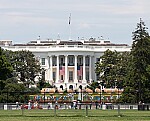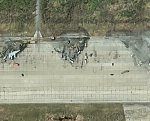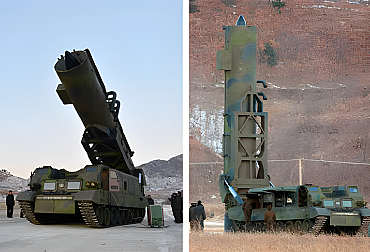India is undermining European interests in Ukraine: Supplies of microchips for Russian weapons are reaching record levels
Indian companies now provide one-fifth of the sensitive technologies supplied to Russia's defense sector. Exports of controlled items, including microchips and machine tools, exceeded $60 million in both April and May—about double the previous months—with July figures surging to $95 million. India has thus become the second-largest supplier, after China, of critical technologies enabling Russia’s ongoing military operations in Ukraine.

The data, published by Bloomberg, highlights the challenges Western states face in limiting Russia's weapons production capacity. Direct exports of sensitive technology to Russia are banned, leading Moscow to rely on purchases from third countries. Suppliers to Russia include unwitting subsidiaries of Western companies and complex networks of intermediaries. In response, the European Union and the United States are pursuing trade sanctions against countries and companies that continue supplying Russian arms manufacturers.
In India's case, however, the West is running up against decades of cooperation with the Soviet Union and successor Russia. The two countries established diplomatic relations in April 1947, shortly before India's independence. Moscow helped New Delhi achieve economic self-sufficiency and supported the development of India's heavy industry, energy, mineral resources or steel production. Moreover, the USSR stood behind India during the Cold War, especially during the India-Pakistan conflict in 1971, when China and the US sided with Pakistan. Moscow repeatedly vetoed anti-India resolutions in the UN Security Council in 1957-1971 in connection with the Kashmir riots. The older generation of political elites in India is therefore strongly sympathetic to Russia.
The close relationship persisted after the Cold War, formalized through annual summits since 2000 and a Strategic Partnership Agreement, expanded in 2010. Indian Prime Minister Narendra Modi and Russian President Vladimir Putin have met 17 times in the past decade.
Beyond politics, Russia and India cooperate closely in economic and defense sectors. India has benefited from discounted Russian oil, which has risen from under 2% of India’s total imports before the Ukraine invasion to over 40% by mid-2024. Indian companies profit from refining and selling this oil on Western markets. The two countries aim to increase their trade volume from $68 billion today (with $60 billion in oil imports) to $100 billion by 2030.
Defense ties are similarly deep-rooted. Over half of India’s military equipment originates from Russia, including the S-400 air defense system, which bars India from the U.S. F-35 fighter program. India has also co-developed weapons with Russia, such as the BrahMos supersonic cruise missile, which recently saw its first export to the Philippines. Moscow provides the Indian armed forces with "reasonably priced weapons without end-user [export] restrictions" and, unlike other countries, is not reluctant to "supply sensitive technology".
Despite this, India seeks greater strategic autonomy and has focused on strengthening domestic manufacturing under the "Atmanirbhar Bharat" policy. While 76% of India’s arms imports came from Russia in 2009–2013, this figure fell to 36% by 2019–2023. India also aims to become a global semiconductor hub, part of its "Make in India" initiative. According to a report this year by Indian think tank MP-IDSA (Manohar Parrikar - Institute for Defence Studies and Analyses), India produces up to 130,000 wafers per month and 70 million chips per day. These production capacities have only come about through cooperation with Western countries, be it Israel (Tower Semiconductor), Japan (Renesas Electronics Corporation) or Taiwan (PSMC - Powerchip Semiconductor Manufacturing Corporation).“India is striving to boost manufacturing to reduce its service-oriented economic dependency,” said Luboš Ulč, head of CzechTrade's Indian branch. The country is open to localizing production across industries, from defense and construction to engineering and energy.
India also plans to invest in small airports for regional traffic. Another growing area is the maintenance and repair of Russian or Soviet military equipment, where firms skilled in modernizing such systems are in high demand. To advance these goals, India welcomes arms companies that offer technology transfers and expertise in radar systems, aircraft engines, drones, and cyber warfare.
Yet the future of India-West cooperation depends on India’s willingness to sever ties with Russia. The supply of sensitive technology to Russia—made possible through Western-supported production in India—conflicts with EU and U.S. interests in Ukraine. Continued trade between India and Russia may lead to sanctions against Indian companies involved, similar to past actions taken against the UAE and Turkey. Only a united Western stance can enforce international law.
In February, the European Union sanctioned Indian company Si2 Microsystems for allegedly supplying semiconductors to Russia. Although the sanctions did not detail Si2’s specific contributions, the company was suspected of aiding Russian military industries.
In July, the United States warned the Confederation of Indian Industry and Indian banks about potential sanctions over ties with Russia's defense sector. “Russia’s military relies on sensitive imports like machine tools and microelectronics, and expects foreign financial institutions to broker these transactions,” U.S. Deputy Treasury Secretary Wally Adeyemo told Indian companies. “Any foreign financial institution engaged with Russia’s military industry risks U.S. sanctions, which could cut off access to the U.S. and other financial systems.”
According to Adeyemo, Western nations are determined to deprive Russia of the “financial and material means to fight” and bring the Ukraine-Russia war to a close in Ukraine's favor. For this strategy to succeed, all support for Russia’s defense industry, including from Indian contractors, must be addressed—even if doing so risks relations with India, a potential ally in a future conflict with China.








